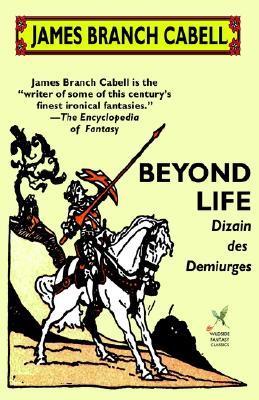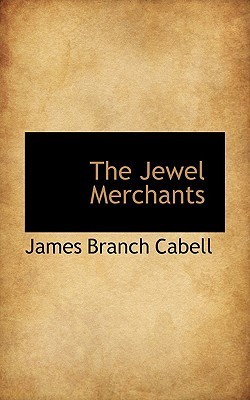


Books in series

#1
Beyond Life
1919
An entry in Cabell's fantastic "Poictesme" series.

#2
Figures of Earth
1921
The story of Manuel the swineherd, who rises to power by playing on others' expectations—his motto Mundus Vult Decipi, meaning "the world wishes to be deceived."

#3
The Silver Stallion
1926
They relate how Dom Manuel that was the high Count of Poictesme, & was everywhere esteemed the most lucky & the least scrupulous rogue of his times, had disappeared out of his castle at Storisende, without any reason or forewarning, upon the feast day of St Michael & All the Angels. They tell of the confusion & dismay which arose in Dom Manuel's lands when it was known that Manuel the Redeemer—thus named because he had redeemed Poictesme from the Northmen, thru the aid of Miramon Lluagor, with a great & sanguinary magic, was now gone, quite inexplicably out of these lands.

#4
The Witch-Woman
A Trilogy About Her
1948
\The Witch Woman\ collects three fantastic novellas set in Poictesme, the imaginary medieval land featured in such Cabell classics as \Jurgen\ and \Figures of Earth, \ all dealing with the most central of Cabell themes, the elusive feminine ideal, here personified in the seductive Ettarre la Beale, the third daughter of Dom Manuel the Redeemer. Here we read how a poet, a king, and a bishop (who also happens to be a werewolf) sought the unattainable Ettarre, and what became of them

#5
Domnei
A Comedy of Woman-Worship
1913
Cabell was an early 20th century author of fantasy fiction. Domnei is subtitled A Comedy of Woman-Worship. This is book four in the series The Biography of the Life of Manuel. The series follows Don Manuel the Count of Poictesme. Poictesme is a fantasy province in France. His physical and spiritual descendents are followed through several generations.

#6
Chivalry
1909
Inasmuch as it was by your command, illustrious and exalted lady, that I have gathered together these stories to form the present little book, you should the less readily suppose I have presumed to dedicate to your Serenity this trivial offering because of my esteeming it to be not undeserving of your acceptance.

#7
Jurgen
A Comedy of Justice Illustrated
1919
One of the most-talked-about works of the 1920s, this compelling fantasy recounts the odyssey of a middle-aged pawnbroker who regains his youth for a year of amorous adventures. Jurgen's allegorical journey leads through a supernatural dreamscape to romances with Guenevere and The Lady of the Lake and confrontations with God and the Devil. This edition of Cabell's witty and irreverent landmark of modern fiction contains the full text of the revised and definitive version of 1926, together with 13 striking full-page illustrations by Frank Papé.

#8
The Line of Love
1905
James Branch Cabell (April 14, 1879 – May 5, 1958) was an American author of fantasy fiction and belles lettres. Cabell was well regarded by his contemporaries, including H. L. Mencken, Edmund Wilson, and Sinclair Lewis. His works were considered escapist and fit well in the culture of the 1920s, when they were most popular. For Cabell, veracity was "the one unpardonable sin, not merely against art, but against human welfare."

#9
The High Place
1923
"In the sulphurous The High Place, the amoral hero Florian enters the sleeping-beauty story and (unlike Jurgen with Helen) does not draw back at the sight of excessive beauty. Complications ensue: Beauty is realistically diminished during pregnancy, the first-born child is forfeit to Satan under the pact that guaranteed Florian's success, and an irascible saint is eager to call down holy fire on transgressors. Florian treads close to damnation and is saved only when Satan and the angel Michael conspire to let recent events become, again, a dream: he has a rare second chance and learns better." — The Encyclopedia of Fantasy

#10
Gallantry
1907
A landmark of classic fantasy from the author of DOMNEI, THE CREAM OF THE JEST, and JURGEN.

#11
Something About Eve
1927
Something About Eve, an entry in the Poictesme series, "shows its non-hero feebly intending to gain promised glory awaiting in the land of 'Antan' but forever delayed on Mispec Moor (anagram: 'Compromise'), wearing literal rose-colored spectacles and beguiled by the woman Maya, while bolder folk like Solomon and Odysseus pass by on the road to Antan." -The Encyclopedia of Fantasy

#12
The Certain Hour
1916
This scarce antiquarian book is a facsimile reprint of the original. Due to its age, it may contain imperfections such as marks, notations, marginalia and flawed pages. Because we believe this work is culturally important, we have made it available as part of our commitment for protecting, preserving, and promoting the world's literature in affordable, high quality, modern editions that are true to the original work.

#13
The Cords of Vanity
1909
James Branch Cabell (1879-1956) is best known for his tales of the imaginary land of Poictesme, where chivalry and galantry live on. All of Cabell’s works from before 1930 (including The Cords of Vanity, an otherwise “mainstream†novel) were assembled into the grand “Biography of the Life of Manuel,†the supposed redeemer of the land of Poictesme, and they form a series which follows Manuel and his descendants through the centuries. Cabell has been a favorite author of many famous writers, raniging from Lin Carter to Robert A. Heinlein. THE CORDS OF VANITY Introduction by Wilson Follett “Mr. Cabell gives an airy chronicle of the love affairs of his hero, Robert Townsend, who has adopted “infancy†as a profession, and never gets out of boyhood. Townsend is also one of the self-hypnotized persons who, in the moment of saying it, believes everything that he says, and thus romances alluringly of himself with no regard to the fetters of fact—truly a captivating liar. In this “higher carelessness†all his contradictions and repetitions are merged into a fine unity. By playing at emotion so long he finally breaks down the inward integrities, so that he is not able to realize when he is acting a part and when he is sincere. And his sin overtakes him in the circumstance that, having played at love so long, he finally is not able to love anybody in reality.†—Edwin Markham, in N. Y. American

#14
From the Hidden Way
1916
"From the Hidden Way" collects Cabell's poetry, which illustrates a mastery of of a wide range of styles and forms, and is filled with sly allusions to Cabell's other books. It was included in the famous Storisende Edition of the collected "Biography of Manuel," which Cabell considered to be the centerpiece of his art.

#15
The Jewel Merchants
1921
GUIDO Am I to be welcomed merely for the sake of my gems? You were more gracious, you were more beautifully like your lovely name, on the fortunate day that I first encountered you ... only six weeks ago, and only yonder, where the path crosses the highway. But now that I esteem myself your friend, you greet me like a stranger. You do not even invite me into your garden. I much prefer the manner in which you told me the way to the inn when I was an unknown passer-by. And yet your pennant promised greeting.

#16
The Rivet in Grandfather's Neck
A Comedy of Limitations
1915
This is a reproduction of a book published before 1923. This book may have occasional imperfections such as missing or blurred pages, poor pictures, errant marks, etc. that were either part of the original artifact, or were introduced by the scanning process. We believe this work is culturally important, and despite the imperfections, have elected to bring it back into print as part of our continuing commitment to the preservation of printed works worldwide. We appreciate your understanding of the imperfections in the preservation process, and hope you enjoy this valuable book.

#17
The Eagle's Shadow
1904
Illustrated by Will Grafé

#18
The Cream of the Jest
1917
This work has been selected by scholars as being culturally important, and is part of the knowledge base of civilization as we know it. This work is in the "public domain in the United States of America, and possibly other nations. Within the United States, you may freely copy and distribute this work, as no entity (individual or corporate) has a copyright on the body of the work. Scholars believe, and we concur, that this work is important enough to be preserved, reproduced, and made generally available to the public. We appreciate your support of the preservation process, and thank you for being an important part of keeping this knowledge alive and relevant.

#20
Straws and Prayer-Books
1924
Straws and Prayer-Books, one of the least well known entries in the Poictesme series, consists of collected shorter works.

#21
Preface to the Past
1936
Cabell, James Branch

#22
Taboo
1921
This short book, published in 1921, is Cabell's response to the publicity that attended the publication of his novel "Jurgen," the subject of a notorious obscenity trial. Here, in his inimitable ironic style, he thanks those who sought to persecute him and, in doing so, launched his career to undreamed-of heights.
Excerpt:
I know, be employed to interpret the dicta Of Ackermann and Macrobius, or even the canons Of Doctors Matthews and Sherman herein cited, and thus open dire vistas wherein critic would prey on critic, and the most respectable would be locked in fratricidal strife. Moreover, I have applied your method to many Of the Mother Goose rhymes with rather curious results. But happily, I have here to confess to you, not any disputable literary standards I may harbor, but only my nu arguable debt.

#23
The Way of Ecben
A Comedietta Involving a Gentleman
1929
An entry in Cabell's fantastic "Poictesme" series.
Author

James Branch Cabell
Author · 28 books
James Branch Cabell was an American author of fantasy fiction and belles lettres. Cabell was well regarded by his contemporaries, including H. L. Mencken, Edmund Wilson, and Sinclair Lewis. His works were considered escapist and fit well in the culture of the 1920s, when they were most popular. For Cabell, veracity was "the one unpardonable sin, not merely against art, but against human welfare."